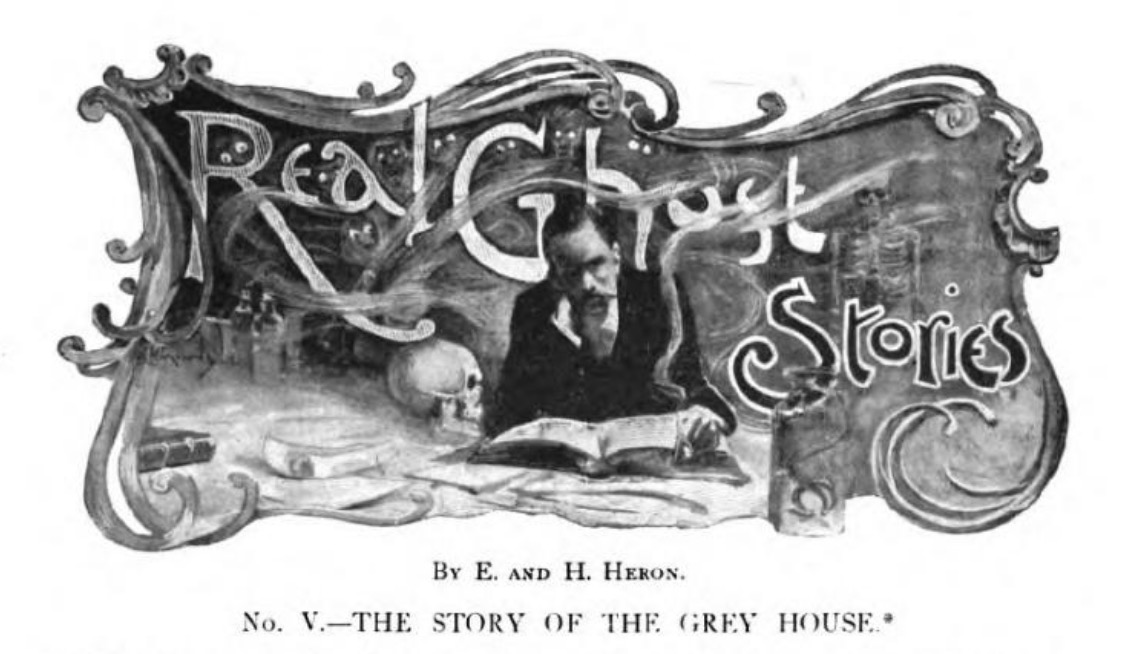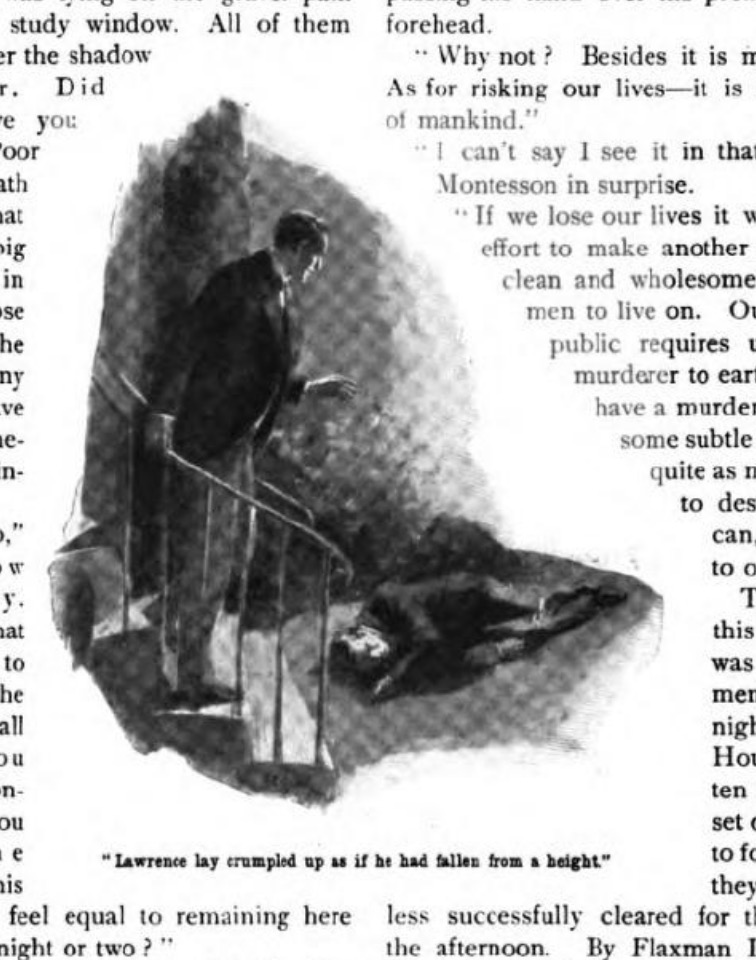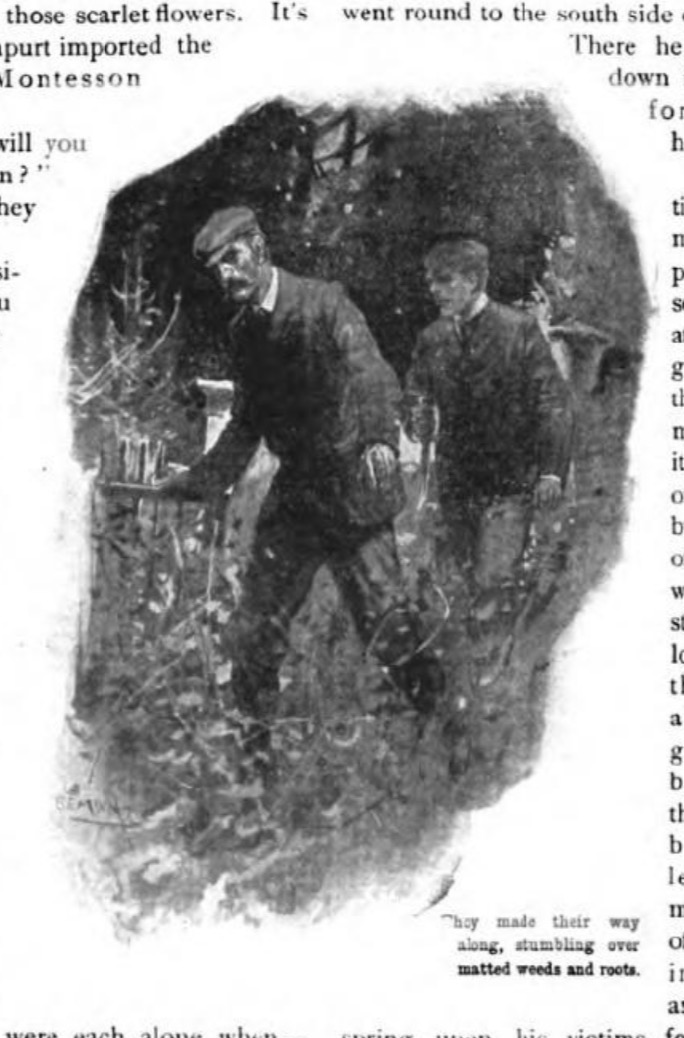THE STORY OF THE GREY HOUSE (3)
By:
October 4, 2024

HiLoBooks is pleased to serialize E. and H. Heron’s occult detective tale “The Story of the Grey House” (Pearson’s Magazine, 1898, so technically just before the sf genre’s Radium Age) for HILOBROW’s readers. Flaxman Low’s curiosity is piqued by the history of the Grey House, where numerous residents have been found mysteriously hanged… even though no rope is ever found.
ALL INSTALLMENTS: 1 | 2 | 3 | 4 | 5.
“Yes, it was hot weather—early in August. This room has not been occupied since. After Platt’s affair, I have always avoided this side of the house, so that it was only by chance Lawrence and I came round to this part of the lawn to smoke.”
“Then we may suppose that the danger, whatever it is, exists on this side of the house only?”
“So it seems,” replied Montesson.
“Your sister was last seen alive in this room? Platt in the room directly below? and your friend—what of him?”

“Lawrence was lying on the gravel path just under the study window. All of them have died under the shadow of the cedar. Did Fremantle give you his idea? Poor Lawrence’s death disposed of that theory. No big ape could live in England all those five years in the open, and in any case it must have been seen sometime in the interval.”
“I think so,” replied Low abstractedly. “Now as to what we must do to try and get at the meaning of all this. Do you feel equal, considering all you have gone through in this house, do you feel equal to remaining here with me for a night or two?”
Montesson again glanced over his shoulder nervously.
“Yes,” he said. “I know my nerves are not as stiff and steady as they should be, but I’ll stand by you—especially as you would not find another man about here willing to run the risk. You see it is not a ghost or any fanciful trouble, it means a real danger. Think over it, Mr. Low, before you undertake so hazardous an attempt.”
Low looked into the blue eyes Montesson had fixed upon him. They were weary, anxious eyes, and, taken in combination with his compressed lips and square chin, told Low of the struggle this man constantly endured between his shaken nervous system and the strong will that mastered it.
“If you’ll stand by me, I’ll try to get to the bottom of it,” said Low.
“I wonder if I should allow you to risk your life in this way?” returned Montesson, passing his hand over his prematurely-lined forehead.
“Why not? Besides, it is my own wish. As for risking our lives—it is for the good of mankind.”
“I can’t say I see it in that light,” said Montesson, in surprise.
“If we lose our lives it will be in the effort to make another spot of earth clean and wholesome and safe for men to live on. Our duty to the public requires us to run a murderer to earth. Here we have a murderous power of some subtle kind; is it not quite as much our duty to destroy it if we can, even at risk to ourselves?”

The result of this conversation was an arrangement to pass the night at the Grey House. About ten o’clock they set out, intending to follow the path they had more or less successfully cleared for themselves in the afternoon. By Flaxman Low’s advice, Montesson carried a long knife. The night was unusually hot and still, and lit only by a thin moon as they made their way along, stumbling over matted weeds and roots, and literally feeling for the path, until they came to the little gate by the lawn. There they stopped a moment to look at the house, standing out among its strange sea of overgrowth, the dim moon low on the horizon, glinting palely upon the windows and over the deserted countryside. As they waited a night-bird hooted and flapped its way across the open.
At any moment they might be at handgrips with the mysterious power of death which haunted the place. The warm lush-scented air and the sinister shadows seemed charged with some ominous influence. As they drew near the house Low perceived a sweet, heavy odour.
“What is it?” he asked.
“It comes from those scarlet flowers. It’s unbearable! Lampurt imported the thing,” replied Montesson irritably.
“Which room will you spend the night in?” asked Low as they gained the hall.
Montesson hesitated. “Have you ever heard the expression ‘grey with fear’?” he said, laughing in the dark; “I’m that!”
Low did not like the laugh, it was only one remove, and that a very little one,from hysteria.
“We won’t find out much unless we each remain alone, and with open windows as they did,” said Low.
Montesson shook himself.
No, I suppose not. They were each alone when—— Good night, I’ll call if anything happens, and you must do the same for me. For Heaven’s sake, don’t go to sleep!”
“And remember,” added Low, “to cut at anything that touches you with your knife.” Then he stood at the study door and listened to Montesson’s heavy steps as they passed up the stairs, for he had elected to pass the night in his sister’s room. Low heard him walk across the floor above and throw wide the window.
When Mr. Low turned into the study and tried to open the window there, he found it impossible to do so, the creeper outside had fastened upon the woodwork, binding the sashes together. There was but one thing left for him to do, he must go outside and stand where Lawrence had stood on the fatal night. He let himself out softly, and went round to the south side of the house.
There he paced up and down in the shadows for perhaps an hour.
In the deceptive, iridescent moonlight a pallid head seemed to wag at him from the gloom below the cedar, but, moving towards it, he grasped only the yellow bunched blossom of a giant ragwort. Then he stood still and looked up into the branches above—the gnarled black branches, with their fringes of sticky, black leaves. Fremantle’s theory of the ape passing stealthily among them to spring upon his victims found a sudden horror of possibility in Low’s mind. He imagined the girl awaking in the brute’s cruel hands——
Out upon the quiet brooding of the night broke a scream—or rather a roar, a harsh, jagged, pulsating roar, that ceased as abruptly as it had begun.
RADIUM AGE PROTO-SF: “Radium Age” is Josh Glenn’s name for the nascent sf genre’s c. 1900–1935 era, a period which saw the discovery of radioactivity, i.e., the revelation that matter itself is constantly in movement — a fitting metaphor for the first decades of the 20th century, during which old scientific, religious, political, and social certainties were shattered. More info here.
SERIALIZED BY HILOBOOKS: Jack London’s The Scarlet Plague | Rudyard Kipling’s With the Night Mail (and “As Easy as A.B.C.”) | Arthur Conan Doyle’s The Poison Belt | H. Rider Haggard’s When the World Shook | Edward Shanks’ The People of the Ruins | William Hope Hodgson’s The Night Land | J.D. Beresford’s Goslings | E.V. Odle’s The Clockwork Man | Cicely Hamilton’s Theodore Savage | & many others.
